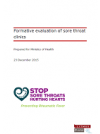Rheumatic fever can be prevented by prompt diagnosis of a Group A streptococcal (GAS) throat infection and treatment with antibiotics. The Rheumatic Fever Prevention Programme aims to improve access to timely treatment for Group A streptococcal throat infections for high risk populations (4–19 year old Māori and Pacific children and young people) through the delivery of sore throat management services. These services consist of a two-pronged approach: school-based and community sore throat clinics (‘sore throat clinics’ are also known as ‘drop in’ or ‘rapid response’ clinics/services).
In July 2015 the Ministry contracted an independent formative evaluation of the sore throat clinic services. The evaluation took place during August and September 2015
The evaluation highlights that, if implemented well, sore throat services will be used. The evaluation also identifies opportunities for DHBs to improve these services.
Purpose
The purpose of the evaluation was to inform service improvement. It used a qualitative methodology and explored the experiences of Māori and Pacific whānau, parents and youth accessing sore throat services, and also of staff working in these services. The participants were from four District Health Boards (DHBs) with a high incidence of rheumatic fever: Counties Manukau, Hutt Valley, Tairāwhiti and Waikato.
Methodology
A total of 48 face-to-face interviews were undertaken with parents whose children had a recent sore throat and young people who had a recent sore throat. Interviews were undertaken with 18 Māori and 18 Pacific parents of children aged 4-19 years and six Māori and six Pacific young people. All parents and young people had visited a general practice sore throat clinic, a standard general practice (that does not have a sore throat clinic contract) or did not access primary care for a recent sore throat.
Interviews and small group discussions were also undertaken with 30 staff in general practice, pharmacy and after-hours sore throat clinics and standard general practices (in high deprivation areas). These interviews were intended to provide context for the services experienced by parents and young people interviewed. They were not intended to be representative of all sore throat clinics.
Key Results
Key themes identified by the evaluation were that sore throat clinics work best and satisfaction is greater when:
- There is a high level of community awareness/communication about where to access free sore throat clinics and who is eligible.
- A consistent and high commitment from providers to deliver sore throat clinics is present and in line with the Ministry’s expectations.
- There is a consistent approach to triaging, assessment and treatment between providers.
The evaluation is useful at this stage in the implementation of sore throat clinics as it gives a good indication of implementation issues consistently emerging in DHBs. It has formed the basis of useful conversations with DHBs, particularly around improving services to priority populations.

